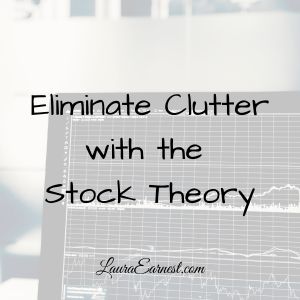A friend and I were having lunch when I told her about my inability to throw out an orchid. A gift to my husband, it had stopped blooming a few years ago, although putting forth healthy shoots. I gave my husband another orchid, but when he asked if I would get rid of the non-blooming one, I said no. After all, all the special needs animals seem to collect at my house. Why would I give up on a plant just because it no longer bloomed?
My friend introduced me to the stock theory to eliminate clutter. I have her permission to relate it.
The Stock Theory To Eliminate Clutter
If you are considering buying a stock, you decide partly on how much it costs now. You also have to know what the prospects are for the company at the time, as well as projections for the near future.
In the Stock Theory To Eliminate Clutter, you decide if you would buy the object today, at today’s prices, knowing what you know about the usefulness and the current state of the item. If not, it should leave your house.
Applying the Stock Theory To Eliminate Stuff
I ask myself a series of questions when I am going through my belongings. Some of them are practical: do I use it? am I taking care of it? Some are emotional: do I love it?
But the stock theory adds another question: would I buy this article today, knowing what I know about it in its current state?
The Food Processor
For example: I have a Cuisinart food processor. It sits in a high cupboard and rarely gets used. I don’t really use it – most of the time I will either chop/shred things by hand in small batches or use the chopping blade on my blender.
I am taking care of it. Loving it? Well, this is not one of those appliances that inspires emotion.
Now the stock question: would I buy it today knowing what I know? The answer is yes. When I do need to shred large amounts of cheese, this is my go-to. This happens about four times a year, and takes minutes rather than an hour to shred 10 pounds of mozzarella. It stays.
A Book Series
Another example: I have the complete paperback set of the Outlander series. I read the first two and then the series languished. Not because of the content, but because of the books themselves, which are thick and hard to transport. I have every intention of finishing the series.
I have used it, and it is well-cared for. I love the story (although on the first book, which I thought was Highlander, I confess to being disappointed by the lack of swords and decapitation; this was soon put aside in the love of the story).
Would I buy these again, knowing what I know now? No. So out went the books, and I got the series in a format more conducive to how I read: on my Kindle.
Applying It to Activities
The Stock Theory can also be applied to other areas of my life. Activities, for example. All I have to ask myself is if I would get involved with the activity knowing what I know now.
The Castle
For example: I love to do cross stitch. I got involved in a beautiful Teresa Wentzler piece that was on really tight fabric with single strands of color together to get the shading. This thing sat in my music room.
I loved the picture of the final product, but the work was too concentrated for me to do in five minute gaps. And I didn’t feel I could move on to another project while this one was going. So as I went through all of my craft projects, I asked myself: would I buy this again knowing what I know now? The answer was no. And I took the fabric off the frame and tossed it in the garbage. No regrets.
District Treasurer
I took on the role of district treasurer for a non-profit group I belong to. The actual bookkeeping wasn’t difficult, nor was doing the monthly and year to date reports.
As district treasurer, I was required to attend monthly meetings. The person in charge of the meetings had changed three times in a year, and there was rarely an agenda, and none of it concerned me. I showed up to ask "are there any questions about the report you received in email?"
When I got sick, I asked myself if this was something I would take on again, knowing what I know now. The answer is no. But since I was elected to the position, I didn’t feel I could just drop it all.
So I told the district leader that I could continue to do the bookkeeping for the remainder of my term, but I would no longer attend the monthly meetings. All questions could be addressed via email or phone call.
The Stock Theory to Eliminate Clutter offers a fresh perspective on decluttering our lives, both in terms of physical possessions and activities. By asking ourselves if we would acquire an item or commit to an activity today, knowing what we know now, we gain clarity on what truly adds value to our lives. This approach encourages mindful decision-making, helping us to let go of things that no longer serve us and make room for what matters most. Ultimately, applying the Stock Theory can lead to a more organized, purposeful, and fulfilling lifestyle, free from unnecessary clutter and commitments.

